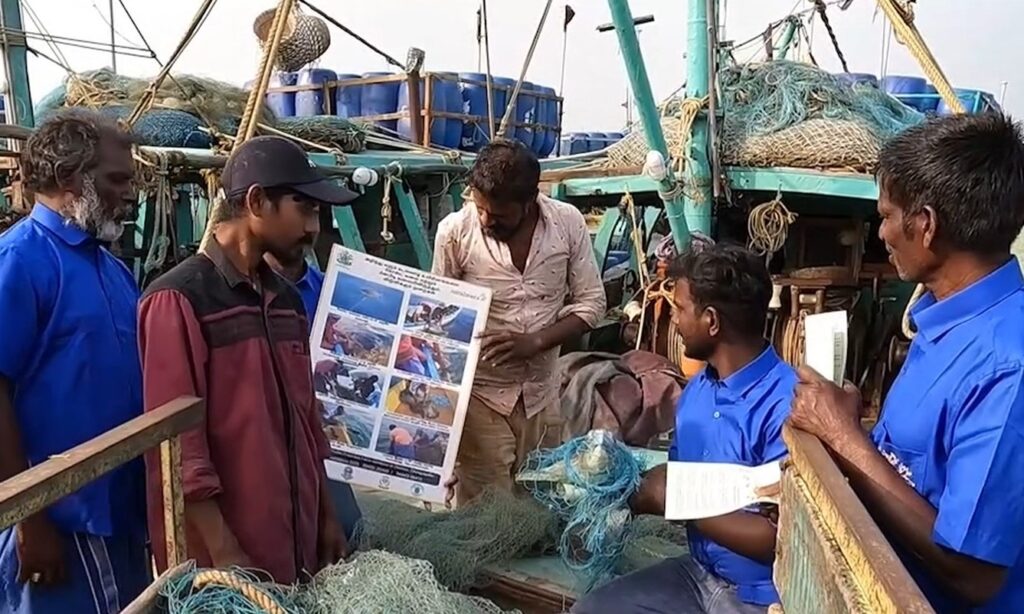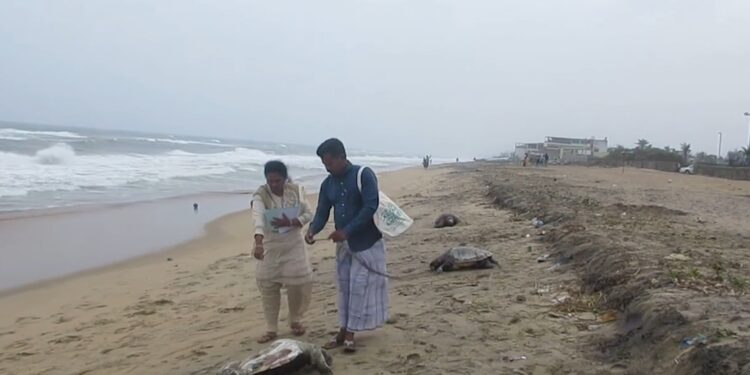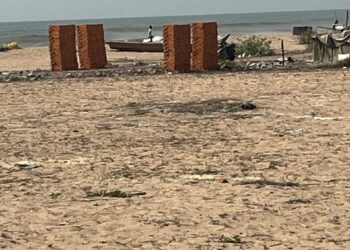Chennai’s beaches are facing an alarming crisis as numerous dead turtles are washing ashore. This unprecedented event has left environmentalists and residents deeply concerned, especially since it coincides with the crucial nesting season for turtles.
TREE Foundation, based in Neelankarai, has been actively working with local fishermen to raise awareness about turtle conservation. They educate fishermen on how to handle turtles caught in their nets. Despite these efforts, the number of turtle carcasses appearing on the shores continues to rise, underscoring the severity of the issue.

In a video shared on TREE Foundation’s Instagram page, an unidentified fisherman reveals the challenges, “At least 4 to 5 turtles get caught in our nets every day. Of them we find at least one turtle injured. Their capture injures our nets too as they get torn,” he says. He explains that they no longer pull nets by hand, but use the winch. Additionally, the lack of space on their small boats prevents them from providing care to the injured turtles. “We see that the turtle is weak, but we have no room in our boats. So, we release it back into the ocean,” he adds and laments, “Anywhere we go to fish, turtles are getting caught in the nets!”
Dr.Supraja Dharini, from TREE Foundation, explained, “Commercial fishing vessels use both trawl nets and gill nets. Turtles get caught in these nets and are unable to come up to breathe. Turtles have to surface every 40-45 minutes to breathe. When they get trapped in trawl nets or entangled in gill nets they cannot come to the surface and thus drown and die. When the nets are drawn, the dead turtles are thrown back into the sea and, from there washed ashore. This is truly heartbreaking. We are very sad.”
She added, “The Tamil Nadu Marine Fisheries Regulation Act (TNMFRA) should be effectively enforced by the Fisheries Department to mandate that commercial fisheries, including trawlers, operate beyond 8 nautical miles from the shore. This regulation is crucial to safeguard artisanal fisheries, whose sustainable practices are also vital for protecting migratory sea turtles.
TREE Foundation is closely monitoring the beaches and documenting the details of the turtle deaths. The organization is also calling for volunteers to assist in their conservation efforts. Concerned individuals can lend their support by contacting TREE Foundation at 94443 06411 or 24496411. For more information and to learn how you can help, visit their website: treefoundationindia.org.
Let’s come together to protect these majestic marine creatures and ensure they continue to thrive along our coasts.
More about the endangered Olive Ridley Turtles
Olive Ridley Turtles are protected in India under the Wildlife (Protection) Act of 1972 and are listed as vulnerable on the International Union for Conservation of Nature’s (IUCN) Red List. They are also protected under the Migratory Species Convention and the Convention of International Trade on Wildlife Flora and Fauna (CITES).
Multiple reports state that over the decade their population has nearly halved. The World Wildlife Federation states, “Their vulnerable status comes from the fact that they nest in a very small number of places, and therefore any disturbance to even one nest beach could have huge repercussions on the entire population.” These turtles play a vital ecological role as one of the few predators of jellyfish, which pose a threat to fish stocks. Their conservation is crucial not only for marine biodiversity but also for the fishing industry that relies on balanced ecosystems.
India’s east coast, including Chennai, is a significant nesting site for Olive Ridley Turtles. During nesting season, which peaks in January and February, female turtles return to the very beaches where they were born to lay eggs. This phenomenon, known as arribada, sees up to 600,000 turtles emerge from the sea over five to seven days to nest.
The recent surge in turtle deaths poses a dire threat to this fragile cycle. The loss of even a few hundred turtles can have a profound impact on their population recovery.
Currently, apart from the awareness programmes, there is an urgent need for the government to act on the issue and look for safe fishing practices – one where the turtles are not harmed.











